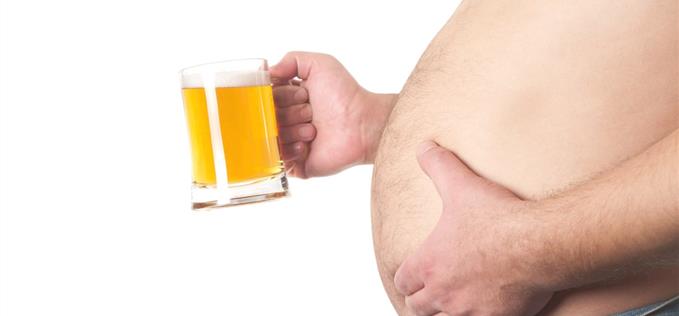BEER gets a bad press.
We are aiming to dispel the myth that beer causes a 'beer belly'
Let's call it branding issues.
Sure, the ‘hop heads’, Lager louts and Bavarian boozers appear content enough, but to identify oneself as a ‘beer drinker’ is to almost admit ownership of a beer belly – no matter what Carlsberg tell you (and let’s be honest beer followed by ‘battered’, ‘canned’ or ‘soaked’ is also hard to resist).
We’ve long assumed the nation’s favourite bevvy to bad for our diets, but strangely, not wine... no sir. Wine is the holy alcoholic beverage, after all, Jesus drank it.
Plus they drink it all the time in the continent and look at 'em, the happy, tanned, long-living swines.
So where does the idea that beer = bad and wine = better (not good but better) come from?
Recent research by beerforthat.com (non-partisan, of course) has revealed that we should rethink our drinking habits.
Beer is naturally low in sugar, with a lower calorific value compared to other alcoholic drinks, yet 12% of Brits think half a pint of beer has more calories than a small glass of wine (175ml). The reality is half a pint of beer, at around 91 calories, contains significantly fewer calories than a small glass of wine 141 at calories.
 Is the dreaded beer belly a myth?
Is the dreaded beer belly a myth?The research also found that a quarter of Brits think a pint of beer has more sugar than their daily Frappuccino, with a quarter not knowing that there's actually only 2.5g sugar in half a pint of beer, compared to 35g in a tall Frappuccino.
The study, which questioned 2000 British adults, goes on to reveal 39% of UK adults thought drinking beer makes them fat, with 29% ‘under the impression that a half a pint of beer has more calories than a burger’.
Beer also stomps chocolate when it comes to fat, with the average bar of milk chocolate containing 13.5g, whereas a pint of beer has ‘absolutely no fat in whatsoever’.
On the face of it, the research portrays beers as a lesser evil, and to some extent it is. Still, the term 'beer belly' must derive from some truth? Beer tends to be consumned in pints and in quantities of two, three, five, or more. Surely this can't be good for the waistline?
Drinkaware, the UK's alcohol awareness board, agrees. It says a man drinking five pints a week (the equivalent of 260 pints a year) consumes 'the same amount of calories as someone who gets through 221 doughnuts in a year' and claims 'the worst calorie culprits are beer, lager and cider.'
Drinkaware adds: 'on a heavy night out drinking beer or cider, you could be consuming almost your whole day's healthy calorie intake (2,500 for men) just in alcohol. And that's not even including the chips, takeaway pizza and hangover fry-up the next day'.
In many ways then it's contradictory advice.
However Fiona Hunter, nutritionist at beerforthat.com, puts moderate beer drinkers at ease:
"When consumed moderately beer has some health and nutritional benefits. Beer contains fewer calories than wine but many people don't actually realise this. People often talk about the health benefits associated with wine, red wine in particular, but some don't realise that studies show that consumed in moderation, as part of a healthy balanced diet, beer is also associated with reduced risk of heart disease.
"We are aiming to dispel the myth that beer causes a 'beer belly' – there is no evidence to support this at all."
Ah 'moderation' - a marketers' safe word. Unfortunately, moderation doesn't usually go hand-in-hand with the average beer swilling archetype (outdated as it may be). In a culture known for excessive drinking, we should take this research with a pinch of salt... and no added sugar.
Heavy drinkers be warned, the beer belly bloat is still very real.
Find out more at beerforthat.com
Follow @LOreal_B on Twitter











